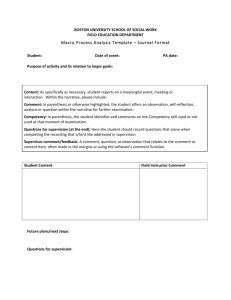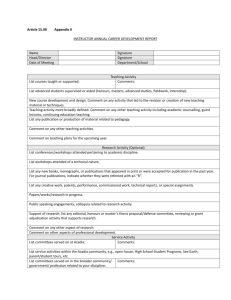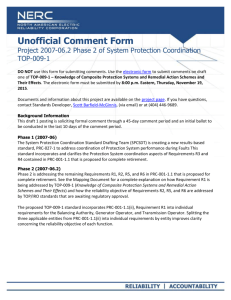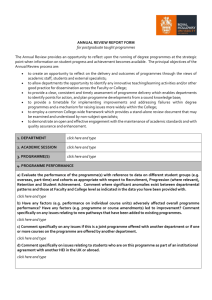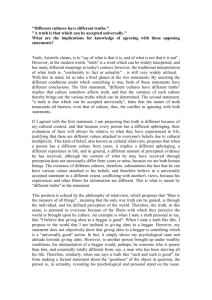Discussion questions
advertisement
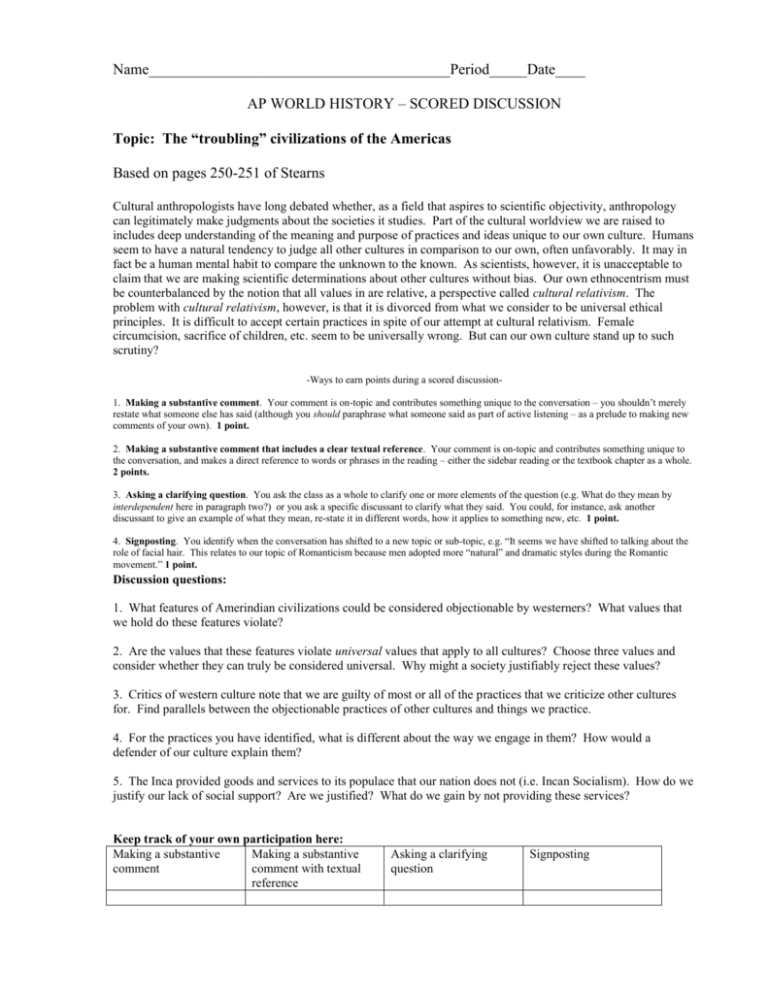
Name________________________________________Period_____Date____ AP WORLD HISTORY – SCORED DISCUSSION Topic: The “troubling” civilizations of the Americas Based on pages 250-251 of Stearns Cultural anthropologists have long debated whether, as a field that aspires to scientific objectivity, anthropology can legitimately make judgments about the societies it studies. Part of the cultural worldview we are raised to includes deep understanding of the meaning and purpose of practices and ideas unique to our own culture. Humans seem to have a natural tendency to judge all other cultures in comparison to our own, often unfavorably. It may in fact be a human mental habit to compare the unknown to the known. As scientists, however, it is unacceptable to claim that we are making scientific determinations about other cultures without bias. Our own ethnocentrism must be counterbalanced by the notion that all values in are relative, a perspective called cultural relativism. The problem with cultural relativism, however, is that it is divorced from what we consider to be universal ethical principles. It is difficult to accept certain practices in spite of our attempt at cultural relativism. Female circumcision, sacrifice of children, etc. seem to be universally wrong. But can our own culture stand up to such scrutiny? -Ways to earn points during a scored discussion1. Making a substantive comment. Your comment is on-topic and contributes something unique to the conversation – you shouldn’t merely restate what someone else has said (although you should paraphrase what someone said as part of active listening – as a prelude to making new comments of your own). 1 point. 2. Making a substantive comment that includes a clear textual reference. Your comment is on-topic and contributes something unique to the conversation, and makes a direct reference to words or phrases in the reading – either the sidebar reading or the textbook chapter as a whole. 2 points. 3. Asking a clarifying question. You ask the class as a whole to clarify one or more elements of the question (e.g. What do they mean by interdependent here in paragraph two?) or you ask a specific discussant to clarify what they said. You could, for instance, ask another discussant to give an example of what they mean, re-state it in different words, how it applies to something new, etc. 1 point. 4. Signposting. You identify when the conversation has shifted to a new topic or sub-topic, e.g. “It seems we have shifted to talking about the role of facial hair. This relates to our topic of Romanticism because men adopted more “natural” and dramatic styles during the Romantic movement.” 1 point. Discussion questions: 1. What features of Amerindian civilizations could be considered objectionable by westerners? What values that we hold do these features violate? 2. Are the values that these features violate universal values that apply to all cultures? Choose three values and consider whether they can truly be considered universal. Why might a society justifiably reject these values? 3. Critics of western culture note that we are guilty of most or all of the practices that we criticize other cultures for. Find parallels between the objectionable practices of other cultures and things we practice. 4. For the practices you have identified, what is different about the way we engage in them? How would a defender of our culture explain them? 5. The Inca provided goods and services to its populace that our nation does not (i.e. Incan Socialism). How do we justify our lack of social support? Are we justified? What do we gain by not providing these services? Keep track of your own participation here: Making a substantive Making a substantive comment comment with textual reference Asking a clarifying question Signposting

